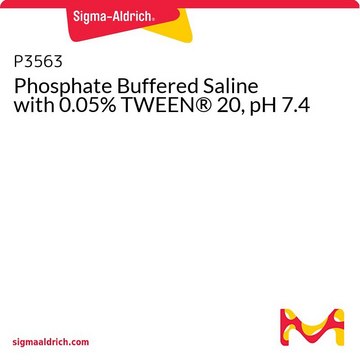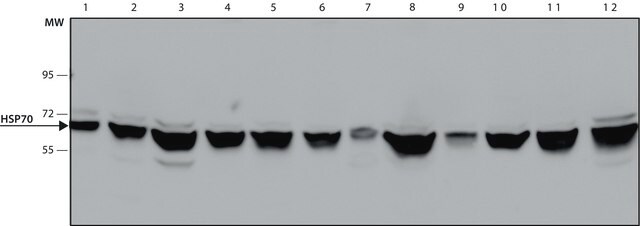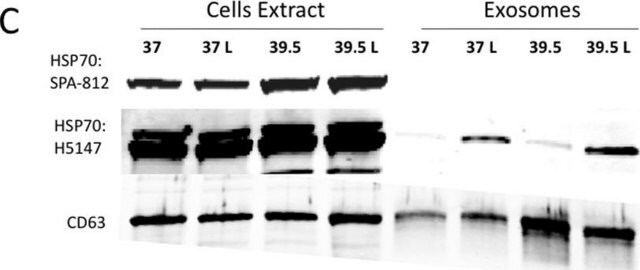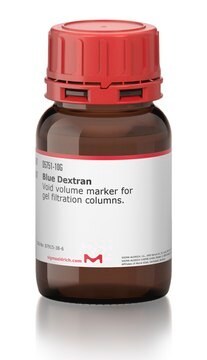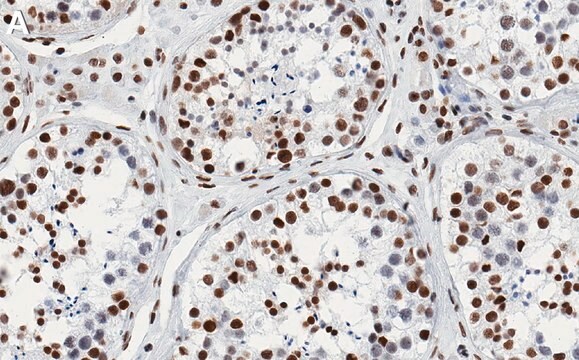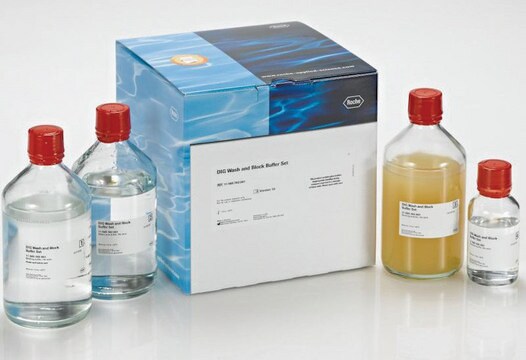ZMS1177
Anti-BRG1/SMARCA4 Antibody, clone 20C3.2 ZooMAb® Mouse Monoclonal

recombinant, expressed in HEK 293 cells
Synonym(e):
ATP-dependent helicase, BAF190A, BRG1-associated factor 190A, Mitotic growth and transcription activator, Protein BRG-1, Protein brahma homolog 1, SMARCA4, SNF2-beta, SWI/SNF-related matrix-associated actin-dependent regulator of chromatin subfamily A member 4, Transcription activator BRG1
About This Item
Empfohlene Produkte
Biologische Quelle
mouse
Qualitätsniveau
Rekombinant
expressed in HEK 293 cells
Konjugat
unconjugated
Antikörperform
purified antibody
Antikörper-Produkttyp
primary antibodies
Klon
20C3.2, recombinant monoclonal
Beschreibung
recombinant, expressed in HEK 293 cells
Produktlinie
ZooMAb® learn more
Form
lyophilized
Aufgereinigt durch
using protein G
Speziesreaktivität
human, rat
Verpackung
antibody small pack of 25 μL
Grünere Alternativprodukt-Eigenschaften
Waste Prevention
Designing Safer Chemicals
Design for Energy Efficiency
Learn more about the Principles of Green Chemistry.
Erweiterte Validierung
recombinant expression
Learn more about Antibody Enhanced Validation
sustainability
Greener Alternative Product
Methode(n)
immunocytochemistry: suitable
immunohistochemistry: suitable
western blot: suitable
Isotyp
IgG1κ
Epitopsequenz
Unknown
Protein-ID-Hinterlegungsnummer
UniProt-Hinterlegungsnummer
Grünere Alternativprodukt-Kategorie
Versandbedingung
ambient
Lagertemp.
2-8°C
Verwandte Kategorien
Allgemeine Beschreibung
Spezifität
Immunogen
Anwendung
Evaluated by Western Blotting in K562 cell lysate.
Western Blotting Analysis (WB): A 1:10,000 dilution of this antibody detected BRG1/SMARCA4 in K562 cell lysate.
Tested Applications
Western Blotting Analysis: A 1:10,000 dilution from a representative lot detected BRG1/SMARCA4 in HeLa cell nuclear extract and 1:1,000 dilution detected BRG1/SMARCA4 in C6 cell lysate.
Immunohistochemistry (Paraffin) Analysis: A 1:100 dilution from a representative lot detected BRG1/SMARCA4 in Human prostate and Human kidney tissue sections.
Immunocytochemistry Analysis: A 1:100 dilution from a representative lot detected BRG1/SMARCA4 in HeLa cells.
Note: Actual optimal working dilutions must be determined by end user as specimens, and experimental conditions may vary with the end user.
Zielbeschreibung
Physikalische Form
Lagerung und Haltbarkeit
Sonstige Hinweise
Rechtliche Hinweise
Haftungsausschluss
Sie haben nicht das passende Produkt gefunden?
Probieren Sie unser Produkt-Auswahlhilfe. aus.
Lagerklassenschlüssel
11 - Combustible Solids
WGK
WGK 1
Flammpunkt (°F)
Not applicable
Flammpunkt (°C)
Not applicable
Hier finden Sie alle aktuellen Versionen:
Analysenzertifikate (COA)
It looks like we've run into a problem, but you can still download Certificates of Analysis from our Dokumente section.
Wenn Sie Hilfe benötigen, wenden Sie sich bitte an Kundensupport
Besitzen Sie dieses Produkt bereits?
In der Dokumentenbibliothek finden Sie die Dokumentation zu den Produkten, die Sie kürzlich erworben haben.
Unser Team von Wissenschaftlern verfügt über Erfahrung in allen Forschungsbereichen einschließlich Life Science, Materialwissenschaften, chemischer Synthese, Chromatographie, Analytik und vielen mehr..
Setzen Sie sich mit dem technischen Dienst in Verbindung.


